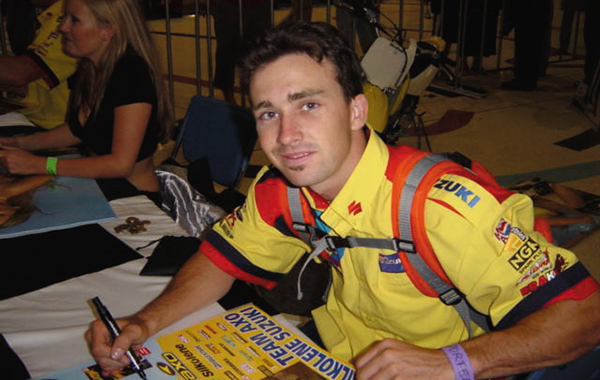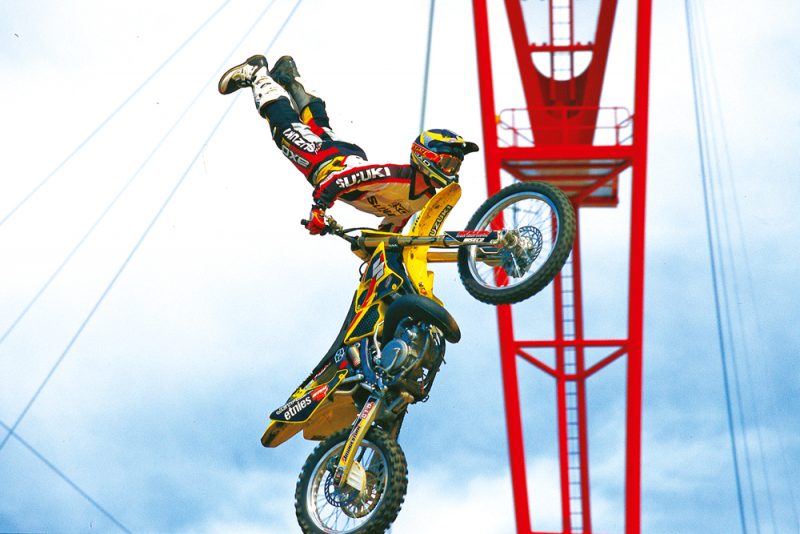
Jono Porter was a step ahead in so many ways. He was arguably the most popular and recognisable rider in Australia, and he got that way by understanding the potential of professional marketing and taking your future into your own hands.
DIRT ACTION spoke to Jono back in 2003 and the advice he offered still stands-up today and any smart racer should listen, 17 years on, to a guy that was on another level.
Jono passed away in June 2004, but his words and his approach is every bit as relevent in 2020 as it was in his prime.

I used to organise heaps on my own before I joined the Max Team and started working with Ken and Penny, but doing things now is a whole other level that I want to know all about. Seeing as everything has come up pretty well, I thought I would share with you some of my tips on how to deal with sponsors:
- Set targets for the money and gear you need.
- Before you go into any meeting you need to know how much everything will cost, but don’t budget on doing everything as cheap as you can, because things can go wrong. Over-budget so you don’t run out of money during the season.
- Set an amount for naming rights and sell all good spots on bike for certain good amounts and keep the rear guard for product sponsors only.
- The truth is, it is really hard to go in and tell someone you want to wear their gear and then tell them they will have to pay you to wear it. Before this year, I had never actually negotiated a contract. Someone would just offer me an amount of product or money for sponsorship or even to do a freestyle show and I would just say yes or no. But this time, I was naming the price. Because I had everything planned out, when I went into a meeting and knew the answers to questions, I felt okay about it.
- Go to places where you will meet people who may help you. JPi and I got a massive kickstart for the ’04 season by being at the Australian Motorcycle Expo at Melbourne late last year and having the whole race set up there. It meant I met distributors and industry people on a different level and spoke to them on a different level than you seem to in the pits at the track.
- Set times and meetings to sit down and speak with potential sponsors in places where you can have proper discussions — even if it is on the phone. In the week leading up to the Australian Motorcycle Grand Prix at Phillips Island I took a week out to go and talk to potential sponsors and it was a couple of these meetings that have really facilitated what we are doing in 2004.
- Be honest with potential sponsors. Don’t be shy and just tell them what they want to hear. Be up front about how much you need and then you will know what you can or can’t do. This even goes right down to how much gear you really need to ride in a season.
- Do not over-promise. You have to realise there are not that many spots to put stickers on your bike and that some spots are worth more than others because of how the media photograph races and freestyle events and what crowds can see. Even if a bigger sponsor’s sticker is not the coolest one, if they have given you more, you have to put it in the places on the bike that will get the best pick up. Also, once you tell them you are putting a sticker in a certain place, make sure it is always there. Last year I was riding new bikes and with new gear all the time and a couple of times my bikes and gear did not always have the proper stickers in the proper places, which is something I regret.
- Make sure you keep in touch with your supporters. In 2003, I realised that even though the team was communicating via email that many people did not seem to notice these, so the phone is the best option to keep everyone updated. Let your sponsors know how you are going.
- Start planning for the following race year in the middle of the current year. This means you will be ready for the beginning of the new season in January. Between bike graphics, pit shirts and getting everything ready to go on the road, there is quite a lot to do. Lots of things that take time.
- Only roll out with what you can afford. It is better to start smaller and get bigger. If you try to do things you have not really got the money or support to do, then you are putting yourself at a financial risk. It is better to have an objective of getting bigger and having a stable future.


